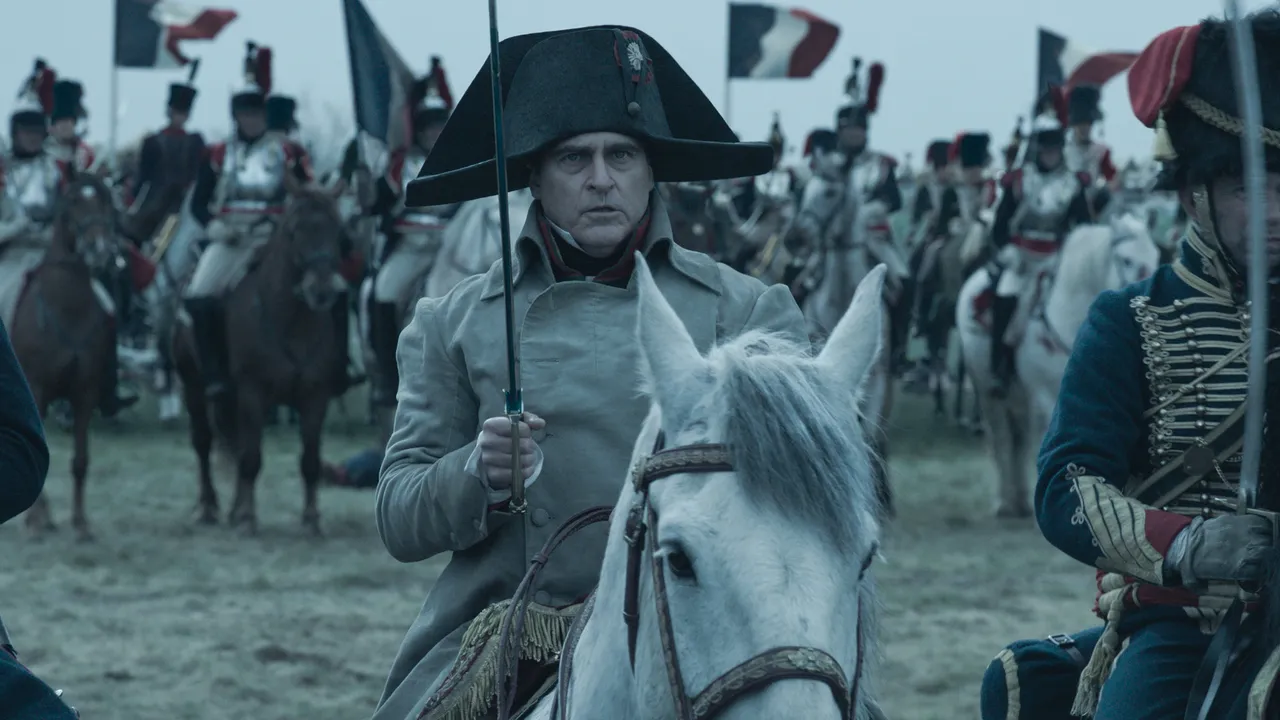
2023 has seen multiple historical epics grace the big screen as if the 1960s have returned. Audiences seem to be warming up to witnessing history unfold in theaters with the hype surrounding multiple pictures and director Ridley Scott’s biographical telling of the story of Napoleon Bonaparte (Joaquin Phoenix) seems poised to be the latest example of the year’s trend.
The film is structured as a telling of two halves of Napoleon’s life which run parallel to each other; that of his political and military life and that of his personal life, namely his romance with Josephine. The two sides of the legendary leader’s life are juxtaposed against each other as they display the two sides of who Napoleon is as a person. Militarily, the General is a battlefield genius whose tactical cunning was so great it worked to ascend him within France’s chaotic, post-revolutionary political sphere till he ascended to the throne of Emperor. While he was busy conquering enemy armies however, Napoleon was being dominated domestically by his wife whose infidelities and inability to bear him an heir took a mental toll on Napoleon, but whose being the sole object of his love and desire made him putty in her hands and reduced him from an unquestioned leader in the country to an unconfident and insecure man in his household. The film seems to wish to use mirroring the two to make a statement on what drive Napoleon as a person and shaped him into the infamous figure he would become, but the script lacks the connective tissue within the story to give the linkage the proper heft. Instead of feeling intertwined, the love story between Napoleon and Josephine and Napoleon’s professional exploits play out onscreen as separate vignettes, separate parts of whole rather than components of one machine that are driving each other.
The unevenness of the film can be felt in the performance of its star lead. While Phoenix is on the shortlist for the title of best actor currently working, his performance in Napoleon comes across as greatness that just misses its mark. He didn’t even attempt to adopt any semblance of an accent and while it’s not too distracting and he comes to settle into the role somewhat, he never truly feels as if he has fully become Napoleon Bonaparte. This is only more pronounced being paired opposite Vanessa Kirby as Josephine who does well in elevating the script she is given with a quality performance as Napoleon’s disloyal but hypnotizing partner. Kirby perfectly portrays a woman who knows the power she has over a powerful man and is trying to take full advantage of it while she can before her troubles conceiving drive them apart, convincingly displaying the emotional complexity that comes with it. The two make the relationship part of the plot interesting in its own right, even if it feels separate from the movie’s other storyline.
The disconnect between its two halves is what ultimately prevents Napoleon from reaching its full potential as a film. As a retelling of his rise from simple artillery commander to Emperor, it is an interesting historical film replete with stunning production design, battlefield set pieces and stunt coordination, and cinematography. There are battle sequences in Napoleon that are reminiscent of the historical epics of film’s golden era and the apex of 1950s and 1960s war epics Sergei Bondarchuk’s War and Peace. The number of extras, period costuming, and practical effects add up to equal a technical marvel that put both the brutality of warfare and Napoleon’s thirst for power on full display in spectacular fashion. When Napoleon returns to France to interact with Josephine, it also can be compelling to see the complex toxicity of their romance and its effect on both of their psyches. Meshing the two together without them complimenting one another more strongly however makes the film a jumble of tones the longer the film goes on. Indeed, once Napoleon reaches the last fifth of its runtime and the audience watches Napoleon’s descent, the film feels superfluous and the reason for his failures seem half baked and unexplained. The film seems as if it might have benefited from being slightly fleshed out more, one of the instances where a slightly longer runtime would have added cohesiveness and made the film feel shorter even after being elongated. Ultimately, Napoleon is a decent enough film, but the potential left in the table that can be felt leaves the viewer saying “What if?” more than “Job well done.”
Image: Apple TV+ Original Films

